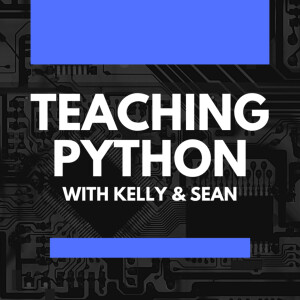

Teaching Python
https://feeds.fireside.fm/teachingpython/rssEpisode List

Episode 146: PSF Education Outreach Workgroup and the Education Summit
In episode 146 of Teaching Python, hosts Sean Tibor and Kelly Schuster Perez delve into the newly established Python Education and Outreach Work Group, featuring guests Cheuk Ting Ho and Keith Murray. The group, aimed at enhancing Python education within the community, outlines its mission to gather feedback on educational resources and support initiatives like the Education Summit at PyCon US. Keith and Cheuk discuss their backgrounds and roles within the Python Software Foundation, emphasizing the need for fresh educational content and community engagement. The episode also explores the work group's goals, which include: Seeking and receiving feedback on Python educational resources Consolidating and improving existing Python education materials Supporting and expanding the education summit at PyCon US Additionally, the hosts share personal 'wins of the week,' highlighting the importance of accountability and community in the educational journey. Kelly and Sean discuss their past experiences with the Education Summit and encourage listeners to get involved by submitting talk proposals or joining in interactive sessions. The episode concludes with practical advice on how educators and enthusiasts can engage with the group to further Python education and outreach.Special Guests: Cheuk Ting Ho and Keith Murray.Support Teaching PythonLinks:PyOhio 2025 — Summer 2025 in Cleveland, OHPythonEduWGCharter - PSF Wiki — The Education & Outreach Workgroup's (EOW) purpose is to support the Python Software Foundation’s mission to promote the Python programming language, especially in supporting and enhancing the education of Python. The Education & Outreach Workgroup is a workgroup of the Python Software Foundation’s (PSF).- Education Summit - PyCon US 2024 — In 2024, PyCon US held its 12th annual Python Education Summit in person!

Episode 145: The Bigger Picture of Teaching Python
In episode 145 of Teaching Python, Sean Tibor and Kelly Schuster-Paredes celebrate their six-year podcast anniversary and discuss the shifts within computer science education and the growing influence of AI. They both reflect on the podcast’s journey, their experiences with Blue Sky, and the milestone of over 500,000 downloads. The conversation delves into the changing landscape of tech roles, emphasizing the importance of foundational coding skills and computational thinking, regardless of emerging technologies like AI. They underline how coding remains a key skill that enables personal growth and opens vast opportunities, even in the face of fast-evolving tech sectors. Our hosts also highlight their exciting upcoming engagements, including the FETC conference and the Pine Crest Innovation Institute, encouraging listeners to remain adaptable and open to new learning avenues. Furthermore, they discuss the concept of adapting computer science curriculums to reflect real-world applications and evolving job markets, focusing on how to better prepare students for future careers. With a mix of personal anecdotes and professional insights, this episode offers a heartfelt look at the impact of teaching coding and the continuous evolution in education and technology.Support Teaching PythonLinks:Learn VIM while playing a game - VIM Adventures — Learning VIM while playing a gameTeaching Python Podcast (@teachingpython.fm) — Bluesky — Teaching Python on BlueskySean Tibor (@seantibor.com) — Bluesky — Sean's profile on BlueskyKelly Paredes (@kellypared.bsky.social) — Bluesky — Kelly's profile on BlueskyFuture of Education Technology Conference | FETC 2025Pine Crest School's Innovation InstituteBett UK: Leading EdTech Event | 22-24 Jan 2025, ExCeL LondonTop announcements of AWS re:Invent 2024 | AWS News Blog

Episode 144: Python in Africa with Kudzayi Bamhare
In episode 144 of Teaching Python, hosts Sean Tibor and Kelly Schuster-Paredes are joined by special guest Kudzayi Bamhare from Zimbabwe. They dive into the important topic of Python education as a driver of innovation in Africa, focusing specifically on the challenges and opportunities in Zimbabwe. The conversation covers how coding communities are forming and thriving despite various hurdles, and how inclusive environments can foster learning and growth in the tech industry. Kudzayi shares his inspiring journey into the world of coding, beginning with his initial exposure to Python and how attending Python conferences like PyCon Namibia have been pivotal in his growth. He emphasizes the importance of community, collaboration, and support in helping budding coders overcome challenges and stay motivated. The discussion also highlights the need for more initiatives and workshops to bridge the gap in tech education across the continent. The episode concludes with insightful ideas on how to create effective learning environments and the role of educators in nurturing future tech talents. Sean and Kelly, alongside Kudzayi, discuss the significance of making coding accessible and engaging, especially in underrepresented regions. They call on listeners to support initiatives that bring Python education to Africa, encouraging a global collaboration to drive technological progress and innovation.Special Guest: Kudzayi Bamhare.Support Teaching Python

Episode 143: Computational Thinking 2.0 with Dr. John Chapin
In Episode 143 of Teaching Python, hosts Sean Tibor and Kelly Schuster-Paredes engage in a compelling conversation with Dr. John Chapin, a renowned computer science educator and presenter at CSTA. As the CS Pathway Leader at the Academies of Loudoun, Dr. Chapin brings over a decade of experience in primary and secondary education, creating and implementing rigorous curricula for post-AP CS students. He shares insights into the transformative power of Computational Thinking 2.0, emphasizing the importance of Python and data science in today's educational landscape. Listeners will gain a deeper understanding of how integrating machine learning, data analytics, and mobile app development into CS education can foster a culture of inquiry, creativity, and collaboration among students and educators. Throughout the episode, Dr. Chapin discusses his recent research on the impact of whiteboarding on student self-efficacy in CS1 classes, as presented at the Association for Computing Machinery's Global Computer Education Conference (CompEd2023). He also shares his experiences conducting professional development workshops for CS teachers across Virginia and his efforts to align CS programs with the evolving needs of the workforce and society. This episode is a must-listen for educators, administrators, and anyone passionate about the future of computer science education, offering actionable ideas and inspiration to enhance their teaching practices and curriculum design.Special Guest: Dr. John Chapin.Support Teaching PythonLinks:(PDF) CT 2.0A Neural Network Playground — Tinker With a Neural Network Right Here in Your Browser. Don’t Worry, You Can’t Break It. We Promise.Teach, learn, and make with the Raspberry Pi Foundation — Discover world-leading curricula, resources, and professional development to support the teaching and learning of AI literacy. We bring together original research, industry expertise, and practical classroom experience to help you bring the excitement of AI into your classroom.Machine Learning for KidsACM CompEd Home - ACM CompEdAbout The Coalition | Data Science for EveryoneAI by Hand ✍️ | Tom Yeh | Substack

Episode 142: Middle School Magic: Integrating AI, Data Science, and Computational Thinking with Kelly Powers
In Episode 142 of Teaching Python, hosts Sean Tibor and Kelly Schuster-Paredes are joined by Kelly Powers, a fellow middle school educator and curriculum designer, to explore the dynamic world of middle school instruction. As a passionate advocate for computational thinking, Powers shares valuable insights on introducing students to the concepts of AI, data science, and cybersecurity in a way that is both rigorous and joyful. Topics Covered Engaging Middle School Students: Strategies for capturing and maintaining student interest. Creativity and Collaboration: How to foster a collaborative environment that inspires creativity. Core Computational Concepts: Real-world applications that make these concepts accessible and interesting. Data Science Projects: Practical advice on integrating data science into your curriculum. Generative AI Ethics: Discussing the ethical use of AI in education. Python as a Teaching Tool: Exploring the versatility of Python for various projects. Key Takeaways Integrating Computational Thinking Skills: Tips on how to weave these skills into everyday classroom routines. Teamwork and Communication: The importance of teamwork and effective communication in coding projects. Engaging Lessons with Python: How Python can be used to create engaging and meaningful projects for students. About Kelly Powers Kelly Powers transitioned from the business world to education, bringing a fresh perspective on teaching computational thinking. She offers invaluable insights into making rigorous and joyful learning experiences for middle school students. Whether you are an experienced teacher or new to the field, this episode is packed with actionable ideas and inspirational moments that will help you create a more engaging and effective learning environment. Tune in for a lively conversation that celebrates the magic of middle school teaching and the endless possibilities of computer science education. Listen to the episode: Teaching Python Podcast Follow us on Social Media: Twitter Facebook LinkedIn ``` Special Guest: Kelly Powers.Support Teaching PythonLinks:CodeHS - Teach Coding and Computer Science at Your School | CodeHS — Everything You Need, All In One Spot CodeHS is trusted by thousands of teachers and schools all over the world.Overview ‹ Scratch — MIT Media Lab — Scratch is the world's most popular coding community for kids. Millions of kids around the world are using Scratch to program their own interactive stories, games, and animations—and share their creations in an active online community. Welcome To Colab - Colab — Colab is an online Jupyter notebook from GoogleComputer Science Teachers Association Connect, Grow, & Share With CS Teachers- — CSTA understands that teaching computer science is hard. That’s why we’re focused on creating a supportive environment for K–12 educators.
You may also like
Create Your Podcast In Minutes
- Full-featured podcast site
- Unlimited storage and bandwidth
- Comprehensive podcast stats
- Distribute to Apple Podcasts, Spotify, and more
- Make money with your podcast












